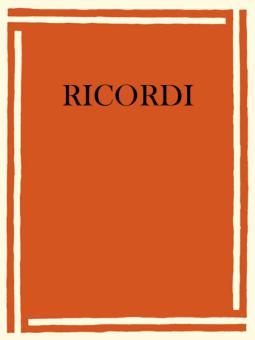Gaetano Donizetti
La fille du régiment
Edizione critica a cura di Claudio Toscani (testi in italiano e inglese)

Gaetano Donizetti
La fille du régiment
Edizione critica a cura di Claudio Toscani (testi in italiano e inglese)
- Compositor Gaetano Donizetti
- Serie UMPC Critical Editions
- Editorial Ricordi
- Nº de pedido NR14014700
IVA incluido.,
Más gastos de envío
No disponible en todos los países. Leer más
Descripción de la:
La fille du régiment, always one of Donizetti's most popular stage works, was first performed at the Thé tre de l'Opéra-Comique in Paris on 11 February 1840. It was composed by Donizetti, to a libretto by Saint-Georges and Bayard, in 1839, for the French debut of soprano Juliette Bourgeois. Later on, Donizetti prepared an Italian version as well, using a libretto adaptation by Calisto Bassi, and making several alterations to the French version of the score (the premiere of the new version, entitled La figlia del reggimento, took place at La Scala Theatre in Milano on 3 October 1840). The opera enjoyed tremendous success at the Opéra-Comique alone, more than one thousand performances were given between 1840 and 1917, and was widely staged in the major European and American opera houses.
Owing to the lack of available autograph music sources only a few score sketches and fragments survive, kept at the Bibliothèque Nationale de France, the principal source for this edition is the printed score prepared by the Parisian publisher Georges Schonenberger during the spring of 1840. Together with the full score, Schonenberger also engraved and printed the orchestral parts. Previously, the publishing house had printed the piano vocal score of several selected numbers from La fille du régiment, as well as the complete score reduction of the work. The Schonenberger edition constitutes, however, a problematical source. The engravers had to work under great pressure - the score was assembled in less than a month -, and the final product turned out to be of mediocre quality, abounding in imperfections, errors, and inconsistencies affecting both the literary and the musical texts. This critical edition has therefore been realized, first of all, through a careful reconstruction process: the text handed down by tradition was compared with a number of sources (including the manuscript scores of the Italian version) that have enabled the editor to address the multiple problems posed by the principal source. The spoken dialogues, missing in the printed music sources, are derived from the libretto used for the première.
The critical edition of La fille du régiment reinstates Tonio's romance «Pour me rapprocher de Marie» from Act Two, included in the original libretto and actually sung at the première, but expunged from the Schonenberger edition of the score. Donizetti himself cut the romance soon after the première, possibly because of the tenor's poor performance - as a result, the omission became customary. The appendices to this critical edition present, additionally, two unpublished variants, handed down in form of complete and autograph score: these pieces, crossed out or modified through the compositional process, add fresh new possibilities to current performance practices. The first one is a duet for Marie and Tonio that Donizetti had originally devised for Act Two, but later deleted from the score. The second one is a preliminary draft of the Act Two Finale, later expunged and replaced, in both music and literary text, by the final version.
Owing to the lack of available autograph music sources only a few score sketches and fragments survive, kept at the Bibliothèque Nationale de France, the principal source for this edition is the printed score prepared by the Parisian publisher Georges Schonenberger during the spring of 1840. Together with the full score, Schonenberger also engraved and printed the orchestral parts. Previously, the publishing house had printed the piano vocal score of several selected numbers from La fille du régiment, as well as the complete score reduction of the work. The Schonenberger edition constitutes, however, a problematical source. The engravers had to work under great pressure - the score was assembled in less than a month -, and the final product turned out to be of mediocre quality, abounding in imperfections, errors, and inconsistencies affecting both the literary and the musical texts. This critical edition has therefore been realized, first of all, through a careful reconstruction process: the text handed down by tradition was compared with a number of sources (including the manuscript scores of the Italian version) that have enabled the editor to address the multiple problems posed by the principal source. The spoken dialogues, missing in the printed music sources, are derived from the libretto used for the première.
The critical edition of La fille du régiment reinstates Tonio's romance «Pour me rapprocher de Marie» from Act Two, included in the original libretto and actually sung at the première, but expunged from the Schonenberger edition of the score. Donizetti himself cut the romance soon after the première, possibly because of the tenor's poor performance - as a result, the omission became customary. The appendices to this critical edition present, additionally, two unpublished variants, handed down in form of complete and autograph score: these pieces, crossed out or modified through the compositional process, add fresh new possibilities to current performance practices. The first one is a duet for Marie and Tonio that Donizetti had originally devised for Act Two, but later deleted from the score. The second one is a preliminary draft of the Act Two Finale, later expunged and replaced, in both music and literary text, by the final version.
